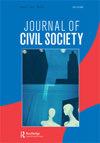Understanding polycentrically organized movements: An analysis of the Slow Food and Fair Trade movements in Europe
IF 0.9
Q3 POLITICAL SCIENCE
引用次数: 0
Abstract
ABSTRACT The Slow Food movement and the fair trade movements have in the past been described as lifestyle movements and defined and understood in terms of their lack of explicit political commitments. In this article we consider the extent to which this view is still true today, drawing on the concept of polycentricity to describe and reflect on the activities of these polycentrically organized movements. The theoretically informed discussion we provide offers a nuanced account of each movement and its effort to engage in different kinds of activities in different contexts that all contribute to advancing its vision. We argue that while activities typical of lifestyle movements are still common in both movements, their overall orientations are more explicitly political than they perhaps once were. While some political activity is local and intended to bring about fairly limited reforms, both movements seek more transformative change at the national and EU levels.理解多中心组织运动:对欧洲慢食运动和公平贸易运动的分析
摘要慢食运动和公平贸易运动过去被描述为生活方式运动,并因缺乏明确的政治承诺而被定义和理解。在这篇文章中,我们考虑了这种观点在多大程度上仍然成立,并利用多中心性的概念来描述和反思这些多中心组织运动的活动。我们提供的理论上知情的讨论对每一个运动及其在不同背景下参与不同类型活动的努力进行了细致入微的描述,所有这些都有助于推进其愿景。我们认为,尽管生活方式运动的典型活动在这两个运动中仍然很常见,但它们的总体取向可能比以前更明确地具有政治性。虽然一些政治活动是地方性的,旨在带来相当有限的改革,但这两个运动都在国家和欧盟层面寻求更具变革性的变革。
本文章由计算机程序翻译,如有差异,请以英文原文为准。
求助全文
约1分钟内获得全文
求助全文

 求助内容:
求助内容: 应助结果提醒方式:
应助结果提醒方式:


